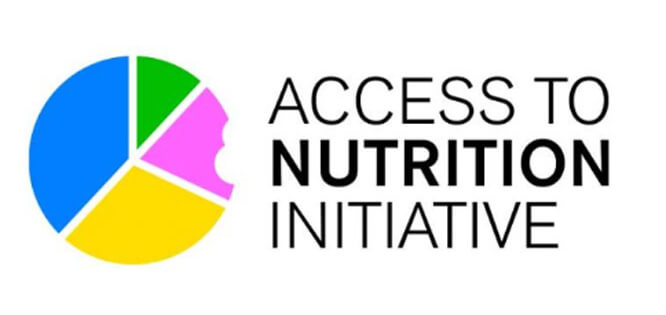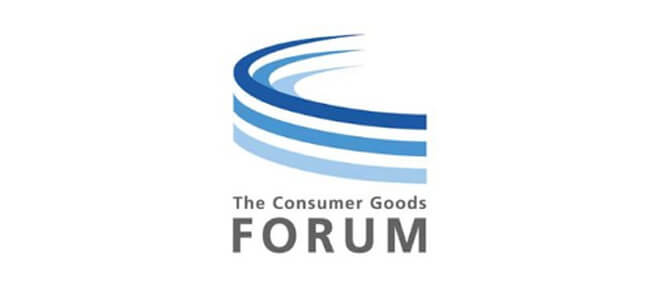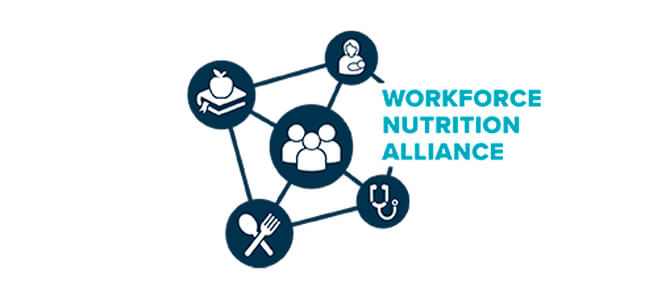Nutrition
Ⅰ. Approach, Policy, and Structure
Ⅱ. Our Approach to Nutrition (Nutrition Without Compromise)
Ⅲ. Targets and KPIs
- 1. Established Target (Nutrition Commitment)
- 2. Updated Targets (Targets and KPIs for Nutrition in FY2030)
Ⅳ. Initiative Examples
Ⅴ. Research
Ⅵ. Partnerships
Ⅰ. Approach, Policy, and Structure
1. Basic Policy
2. Framework for Nutrition Management
The Sustainability Committee formulates nutrition-related policies and strategies, follows up on business unit activities, and collects related information from these units in the same manner as environmental and human rights initiatives. The committee reports this information to the Executive Committee and the Board of Directors. The Board of Directors oversees Company efforts and progress in addressing the risks and opportunities (including on nutrition) identified based on materiality for the Ajinomoto Group.

Ⅱ. Our Approach to Nutrition (Nutrition Without Compromise)
Nutrition Without Compromise
Our Approach to Nutrition
Nutrition Without Compromise, as defined by the Ajinomoto Group, is a core principle that drives our efforts to improve daily nutritional balance and address the growing health challenges linked to diets and lifestyles worldwide.
We believe that helping people around the world access nutritious, healthy meals is essential to solving global health issues. Optimizing global health becomes achievable when nutritious foods taste good, are easily accessible, and respect local customs and flavors. We aim to help people live healthier lives through our Nutrition Without Compromise approach.
Why We Care about Nutrition
Health issues linked to diet and lifestyle are on the rise worldwide, including lifestyle-related diseases, under-nutrition, and over-nutrition. In particular, the double burden of poor nutrition, which stems from a combination of under-nutrition and over-nutrition, is of growing global concern.
Since its founding, the Ajinomoto Group has been committed to promoting nutritious and delicious meals using umami. We are working to address nutrition-related challenges with the aim of realizing our vision of solving global food and health issues.
Our Approach to Nutrition
To address the double burden of under-nutrition and over-nutrition, the Ajinomoto Group supports people's efforts to maintain a delicious, well-balanced diet using umami.
We promote nutritionally balanced diets to solve issues such as insufficient intake of protein and vegetables, as well as excessive intake of sugar, fat, and salt. Utilizing our global network of companies that provides products to consumers in more than 130 countries around the world, the Ajinomoto Group promotes initiatives that advance our principle of Nutrition Without Compromise—nutrition without compromising taste, access to food, or local ways of life.

The Three Pillars of Nutrition Without Compromise
Leveraging the power of amino acids, the Ajinomoto Group is contributing to solving issues around global nutrition. To this end, our commitment to Nutrition Without Compromise consists of these three pillars:
1. Nutrition Without
Compromising Taste

2. Nutrition Without
Compromising Access

3. Nutrition Without
Compromising the Local Way of Life

Our Six Key Initiatives
The Ajinomoto Group identifies key initiatives under our three pillars to promote nutritionally balanced meals.
- Delicious Salt Reduction (key initiative)
- Protein Intake Optimization (key initiative)
- Delicious sugar and fat reduction
- Promoting the intake of fruits and vegetables
- Promoting protein intake from a variety of sources
- Workforce nutrition improvement
Ⅲ. Targets and KPIs
1. Established Target (Nutrition Commitment)
Ajinomoto Group developed our commitment to nutrition in 2021. This commitment outlines our path and KPIs in improving nutrition to help extend the healthy life expectancy of 1 billion people. We announced and registered this commitment at the Tokyo Nutrition for Growth Summit 2021 held in December of the same year.
Activity Reports
- Ajinomoto Group ASV Report 2025 (Integrated Report) P69[PDF:741KB]

- Ajinomoto Group Sustainability Report 2025 P37-48[PDF:1,217KB]

2. Updated Targets (Targets and KPIs for Nutrition in FY2030)
The Ajinomoto Group updated our targets and KPIs for nutrition to strengthen efforts to further drive nutrition improvement through our business. This decision follows steady progress on previous initiatives and is in line with our material theme of achievement of well-being through food under the Ajinomoto Group Purpose to contribute to the well-being of all human beings, our society and our planet with "AminoScience.” We adopted nutritional assessments appropriate for each product, dish, and meal to support consumers’ nutritionally balanced diets and added indicators for communication that contribute to nutrition improvement.

- *1Products with an HSR rating of 3.5 or above. Includes products that can be consumed as-is, by adding water, by heating, or through other simple preparation (e.g., soups, beverages, frozen foods, instant noodles). Excludes sauces and seasonings. For sauces and seasonings, we assess the nutritional value of recipes prepared using our products and aim to offer well-balanced dish and meal options. HSR scientifically evaluates the nutritional value of products based on the content of nutrients to limit (calories, sugars, sodium, saturated fat) and nutrients and food groups to encourage (protein, vegetables, fruits, nuts, legumes, dietary fiber). We checked HSR ranks for applicable products using the ANPS database and calculated totals based on the annual number of servings for products rated 3.5 or above.
- *2We calculated and totaled the annual salt reduction contribution (by weight) for applicable sauces and seasonings, and converted results into the number of servings based on a 1g of salt reduction per serving.
- *3We calculated the annual sugar reduction contribution using annual Group sales and purchase volume and the sweetness level of the target sweeteners. We then converted that total into the number of contributors using WHO guidelines on sugar intake.
Our new targets and KPIs come into effect in fiscal 2025, from which we will track progress each year and share our results transparently with stakeholders. Furthermore, we will continue to explore more refined indicators to further foster well-being through food.
Our new targets and KPIs use more objective and appropriate methods to evaluate the same key nutrients as before, with a focus on advancing our key initiatives in salt reduction and protein intake optimization. With this shift, we will stop tracking and reporting on the previous quantitative targets from fiscal 2024: the percentage of products with improved nutritional value and the provision of products that support delicious salt reduction and protein intake optimization. We will continue to manage the quantitative targets related to the availability of products utilizing the physiological and nutritional functions of amino acids and nutrition education for employees, as part of the targets and KPIs tied to our material themes of contribution to advanced medicine and prevention and reinforcement of our management foundation.
Ⅳ. Initiative Examples
Nutritionally Balanced Meals
Nutrition Profiling System (NPS)
The Ajinomoto Group began operating the Ajinomoto Group Nutrient Profiling System for Products (ANPS-Product) in 2020 as a Group-wide basic tool. This system evaluates the amount of nutrients in a product using science and improves nutrition through new product development and product revisions. ANPS-Product is based on Health Star Rating (HSR).
ANPS-Product and conventional NPS faced limitations in assessing seasonings and other products that are normally not eaten on their own as a self-standing food item. In response, we began developing an NPS to evaluate the nutritional value of dishes prepared with seasonings and other such products. We launched ANPS-Dish in December 2021 as the world’s first nutrient profiling system to take Japan’s food culture and health issues into consideration, making it possible to assess the nutritional value of dishes prepared with seasoning products. We also developed ANPS-Meal, a nutrient profiling system for meal assessments, to evaluate the nutritional value of actual Japanese meals, which are typically based on the ichiju-sansai (one soup, three dishes) structure.
The Ajinomoto Group will continue to collaborate with academia to provide society with products and services that help make eating nutritionally balanced meals easier for consumers.
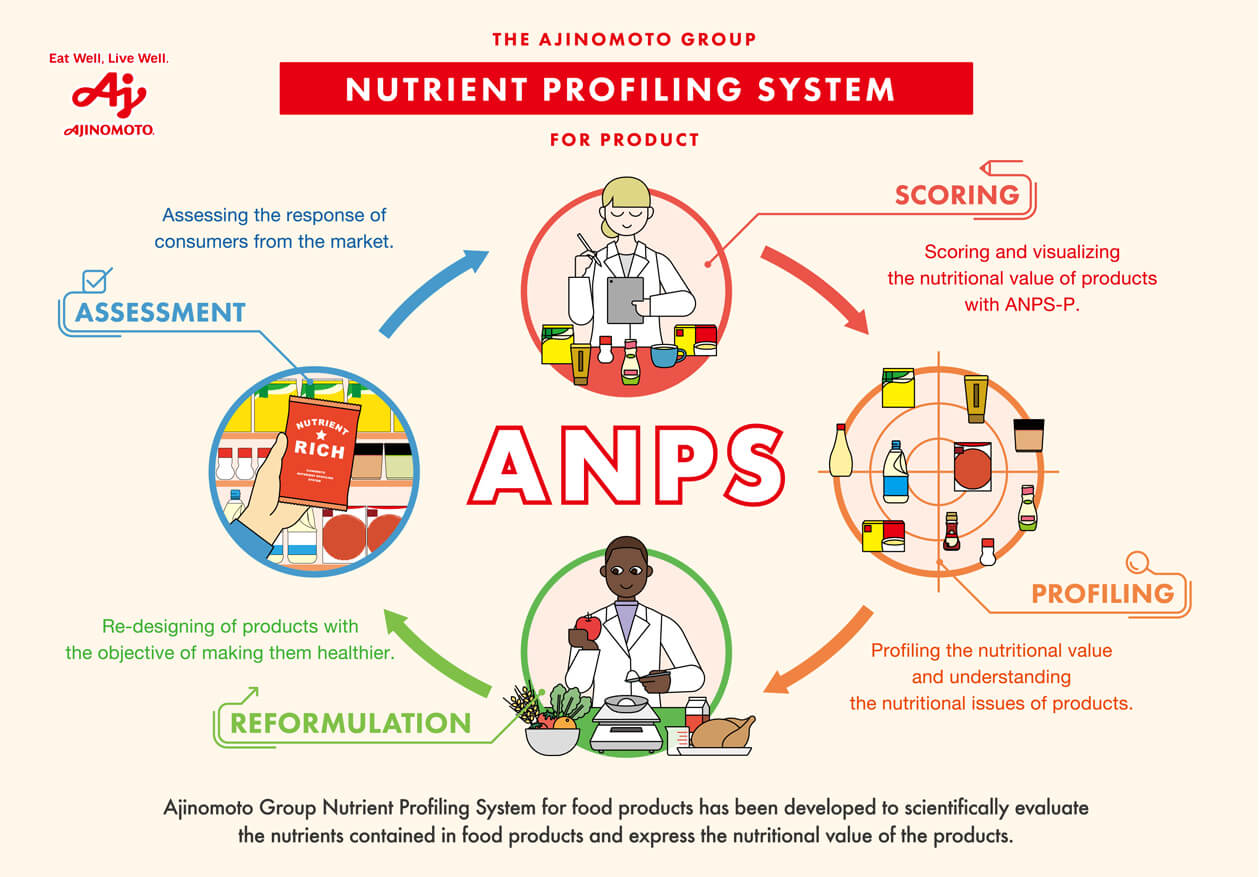
Delicious Salt Reduction
The Ajinomoto Group aims to extend the healthy life expectancy of 1 billion people by 2030. We advance initiatives to limit excessive salt intake, a nutritional challenge faced in Japan and across the globe.
We work with various stakeholders to promote Delicious Salt Reduction using "AminoScience" as we use various media to encourage customers to reduce their salt intake.
Smart Salt initiatives
In July 2020, Ajinomoto Co., Inc. launched the Smart Salt Project to address the issue of excessive salt intake among the Japanese population. We work with government agencies, universities, and other companies to encourage the use of umami and dashi (broth) to practice Delicious Salt Reduction among people of all ages. We also work to leverage our strengths in the Smart Salt Project in Japan to engage in activities overseas that encourage Delicious Salt Reduction.
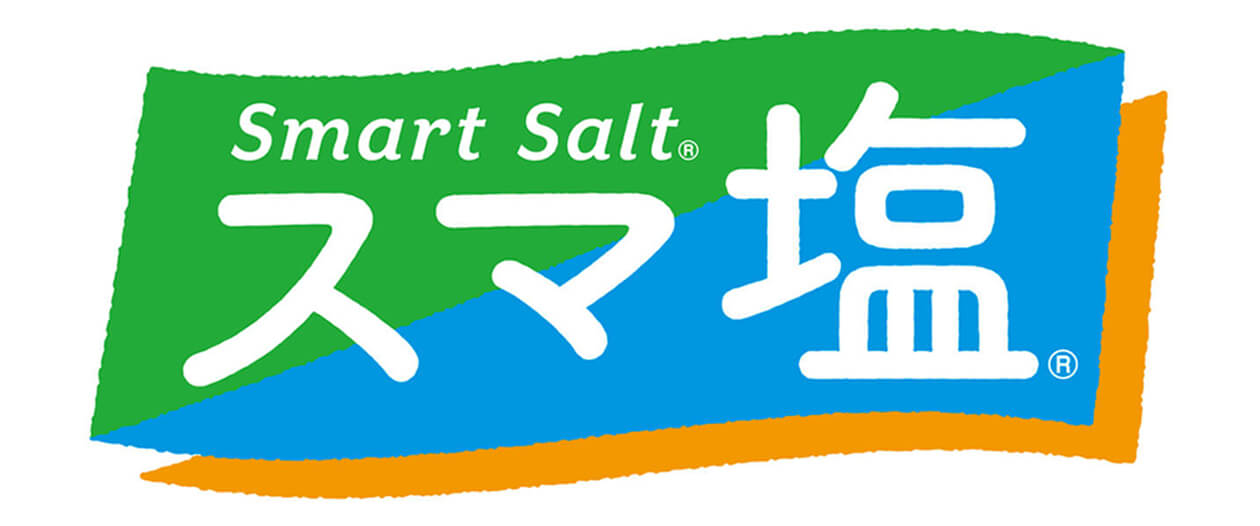
Protein Intake Optimization
The Ajinomoto Group strives to improve protein intake by enhancing the flavor of protein-rich meals with seasonings, offering soups and other products that provide convenient sources of protein, and supplying amino acids that complement low-quality protein sources. We also share recipes, menus, and other information on our website and social media.
Developing Technology to Evaluate the Nutritional Value of Protein
Growing concerns about environmental impact and sustainability are increasing the importance of getting protein from not only animal sources but also from a wider range of foods, including plant-based options. However, plant protein is generally known to be less digestible and absorbable than animal protein. Developing precise techniques to evaluate and improve digestibility is crucial to increasing the nutritional value of plant protein.
The Ajinomoto Group focuses not only on the quantity of protein but also on quality and digestibility. We are also engaged in research to evaluate and improve Digestible Indispensable Amino Acid Score (DIAAS) levels through the utilization of amino acids and food processing technologies.

Other Initiatives
The Ajinomoto Group Sustainability Report 2025 features information on our other initiatives, including delicious sugar and fat reduction, encouraging vegetable and fruit intake, the Love Vege project, efforts to improve nutrition, and nutrition improvement in the workplace.
Ⅴ. Research
This section introduces our nutrition-related research and initiatives advanceded under our founding aspiration of “Eat well, Live well.”
Ⅵ. Partnerships
The Ajinomoto Group is dedicated to working with leading nutrition and health organizations to contribute to the well-being of all human beings, our society and our planet.
